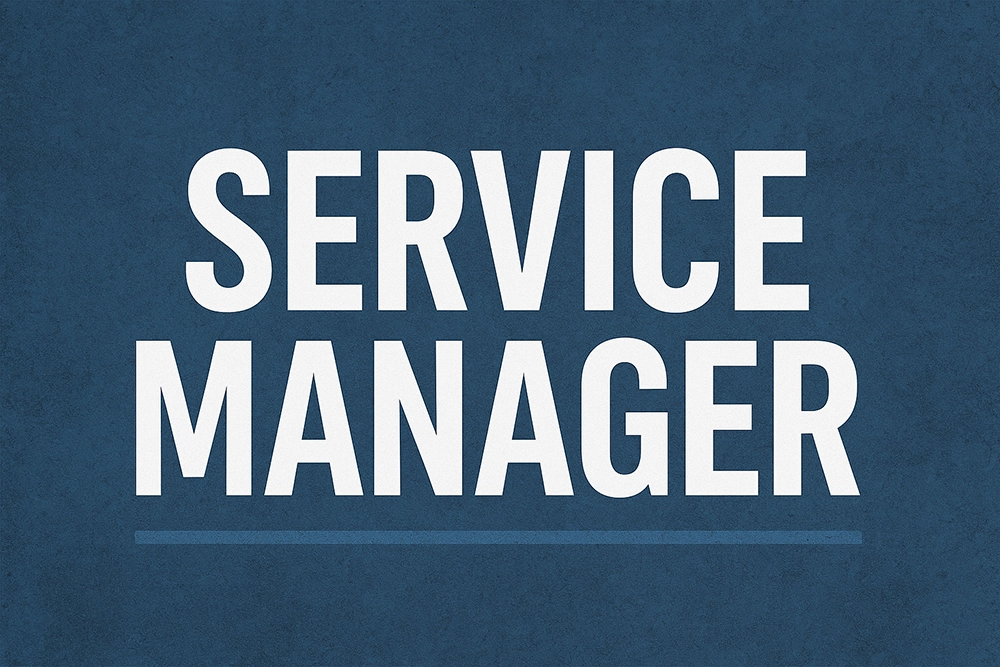In the fast-paced world of automotive service, the service manager stands as the cornerstone of operations, orchestrating everything from customer satisfaction to profitability. Whether in a bustling car dealership or a quick-service lube shop, service managers play a pivotal role in ensuring smooth operations, exceptional customer experiences, and business success. Understanding what a service manager does is crucial for anyone considering this career path or looking to optimize their service department’s performance.
The Service Manager: A Multifaceted Leadership Role
Service managers are responsible for overseeing the entire service department, ensuring it is profitable and running smoothly while having exposure to all aspects of the business, including customers, staff, parts dealers, and upper management. This leadership position requires a unique blend of technical knowledge, business acumen, and exceptional people skills.
The role extends far beyond simple oversight. Service managers serve as the bridge between various stakeholders, including customers seeking reliable vehicle maintenance, technicians performing complex repairs, upper management focused on profitability, and parts suppliers ensuring adequate inventory. This multifaceted responsibility makes the service manager position both challenging and rewarding.
Core Responsibilities of Automotive Service Managers
Staff Management and Development
Service managers handle hiring, training, and managing employees, overseeing staff hiring, training, and firing while ensuring mechanics and parts departments function effectively. This includes recruiting qualified technicians, conducting performance evaluations, implementing training programs, and fostering a positive work environment that promotes productivity and job satisfaction.
Effective staff management involves creating work schedules, assigning tasks based on technician expertise, mediating workplace conflicts, and ensuring compliance with safety regulations. Service managers must also stay current with industry trends and training requirements to keep their team’s skills sharp and relevant.
Financial Management and Budgeting
Service managers prepare annual operating budgets, keep records of accounts and financial information, and regulate departmental expenditures. This financial oversight ensures the service department operates profitably while maintaining competitive pricing and quality standards.
Daily financial responsibilities include monitoring labor costs, tracking parts inventory expenses, analyzing repair order profitability, and identifying opportunities for revenue growth. Service managers must understand key performance indicators such as labor utilization rates, average repair order values, and customer pay versus warranty work ratios.
Customer Service Excellence
Service managers focus on improving customer satisfaction scores and driving revenue growth while handling customer complaints immediately according to dealership guidelines and establishing 24-hour follow-up with all customers to confirm satisfaction. This customer-centric approach is essential for building loyalty and generating repeat business.
Service managers ensure customers receive accurate estimates, timely updates on repair progress, and clear explanations of recommended services. They handle escalated complaints, resolve billing disputes, and implement policies that enhance the overall customer experience. Many also oversee customer satisfaction survey programs and work to achieve manufacturer-required scores.
Operations Management
The day-to-day operations management encompasses scheduling appointments, coordinating workflow between service advisors and technicians, managing parts ordering and inventory, and ensuring efficient shop operations. Service managers must balance customer demand with available resources while maintaining quality standards.
Service managers deal with day-to-day operations, managing inventory, and keeping track of financials while juggling tasks as their daily schedule varies. This operational oversight requires strong organizational skills and the ability to adapt quickly to changing circumstances.
Service Manager Roles in Different Environments
Car Dealership Service Departments
In dealership environments, service managers work within a larger organizational structure that includes sales, parts, and finance departments. They must coordinate with factory representatives, manage warranty claims, and ensure compliance with manufacturer standards and procedures.
Dealership service managers act as go-betweens with factory representatives and create marketing plans for their departments. This role often includes participating in manufacturer training programs, implementing new service procedures, and maintaining certification requirements for technicians.
Quick Lube and Express Service Shops
In quick lube shops and express service centers, service managers focus on high-volume, fast-turnaround services. The emphasis shifts to efficiency, customer throughput, and maintaining consistent service quality across multiple daily transactions.
These environments require managers to optimize workflow processes, ensure adequate staffing during peak hours, manage inventory for high-turnover items like oil filters and wipers, and maintain equipment that supports rapid service delivery. Customer interaction tends to be briefer but no less important for building loyalty and encouraging additional services.
Essential Skills for Success
Technical Knowledge
Service managers need comprehensive understanding of automotive systems, repair procedures, and diagnostic equipment. While they may not perform hands-on repairs, they must communicate effectively with technicians and explain complex issues to customers in understandable terms.
Leadership and Communication
Service managers provide expert knowledge of the automotive industry including marketing operations, general industry trends, and notable marketing campaigns from key brands. Strong leadership skills enable them to motivate teams, resolve conflicts, and create positive work environments that promote excellence.
Business Acumen
Understanding profit margins, labor rates, parts pricing, and operational efficiency metrics is crucial for service department success. Service managers must balance customer satisfaction with profitability while making data-driven decisions that support long-term growth.
Daily Workflow and Responsibilities
A typical day for a service manager begins early, reviewing the previous day’s performance metrics, checking appointment schedules, and ensuring adequate staffing. Throughout the day, they monitor workflow, address customer concerns, review repair estimates, and coordinate with parts departments to ensure timely service completion.
Service managers maintain safe work environments and professional appearances while handling immediate customer complaints and maintaining follow-up procedures. This requires constant attention to both operational details and customer satisfaction metrics.
Technology and Modern Service Management
Today’s service managers utilize sophisticated management software systems that track customer histories, manage inventory, schedule appointments, and generate performance reports. Familiarity with these technologies is essential for effective department management.
Digital communication tools, customer relationship management systems, and mobile applications have transformed how service managers interact with customers and coordinate with their teams. Staying current with technological advances is crucial for maintaining competitive advantage.
Career Advancement and Professional Development
The service manager role often serves as a stepping stone to higher-level positions such as fixed operations director, general manager, or dealership owner. Professional development through manufacturer training programs, industry associations, and continuing education helps service managers advance their careers.
Many successful service managers eventually transition to consulting roles, helping other service departments improve their operations, or start their own automotive service businesses leveraging their comprehensive industry knowledge.
Challenges and Rewards of Service Management
Service management presents unique challenges including managing diverse personalities, balancing customer expectations with realistic service capabilities, staying current with rapidly evolving automotive technology, and maintaining profitability in competitive markets.
However, the rewards are substantial. Successful service managers enjoy competitive salaries, opportunities for advancement, the satisfaction of building successful teams, and the knowledge that they play a crucial role in keeping customers’ vehicles safe and reliable.
Conclusion: The Strategic Importance of Service Managers
Service managers are the linchpin of successful automotive service operations, combining technical expertise, business knowledge, and leadership skills to create thriving departments. Their role continues to evolve with changing automotive technology and customer expectations, making ongoing professional development essential.
Whether in traditional dealerships or modern quick-service environments, effective service managers drive customer satisfaction, team performance, and business profitability. Their strategic importance to automotive service success cannot be overstated, making this career path both challenging and highly rewarding for qualified professionals.
Frequently Asked Questions (FAQs)
1. What qualifications are needed to become a service manager?
Most service manager positions require automotive experience, often 5-7 years in service advisor or technician roles. Many employers prefer candidates with formal automotive training, business education, or management experience. Strong communication skills, customer service abilities, and technical knowledge are essential.
2. What is the average salary range for automotive service managers?
Service manager salaries vary by location, dealership size, and experience level, typically ranging from $50,000 to $100,000+ annually. Many positions include performance bonuses based on customer satisfaction scores, department profitability, and other key metrics, potentially increasing total compensation significantly.
3. How do service manager responsibilities differ between dealerships and quick lube shops?
Dealership service managers handle more complex operations including warranty work, factory relationships, and diverse repair services. Quick lube managers focus on high-volume, standardized services with emphasis on speed and efficiency. Both require customer service excellence and team management skills.
4. What are the biggest challenges facing modern service managers?
Key challenges include managing skilled technician shortages, staying current with rapidly advancing automotive technology, balancing customer expectations with realistic service timelines, maintaining profitability amid increasing costs, and adapting to digital customer communication preferences.
5. What career advancement opportunities exist for service managers?
Service managers can advance to fixed operations director, general manager, or dealership principal roles. Some transition to manufacturer field positions, automotive consulting, or start their own service businesses. Continuous learning and strong performance metrics typically accelerate advancement opportunities.








 Based in the USA
Based in the USA